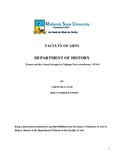Please use this identifier to cite or link to this item:
https://cris.library.msu.ac.zw//handle/11408/2070| Title: | Women and the armed struggle in Chipinge west constituency, 1974-9 | Authors: | Chinyoka, Vote | Keywords: | Women Armed struggle |
Issue Date: | 2015 | Publisher: | Midlands State University | Abstract: | The main objective of the study is to explore the response of women to the Armed Struggle in Chipinge West constituency between 1974-9. The study illustrates the experiences of women in the pre-colonial traditional society prior to the armed struggle and how this was extended to the role of women in the armed struggle in Chipinge West constituency. The role of women at family level in Ndau traditional society in Chipinge played a crucial contribution to support and to sustain the liberation war effort at societal level. The study has demonstrated that the relationship between the freedom fighters and rural masses was that of co-existance. The liberation war fighters taught the masses about the agenda of the armed struggle. The Second Chimurenga propaganda was employed by the freedom fighters in order to identify themselves with the masses and to gain support from the rural public. Very little has so far been said by scholars and writers about the daunting task performed by women in the armed struggle. Women remained the most suffering group. The compelling roles played by women in the armed struggle such as motherhood, providing for freedom fighters and logistics to protect and support the liberation war was the major cause for women to experience the atrocities of the armed struggle. The study revealed that women were occasionally victimised by RENAMO and Chimwenje rebel groups. The respondents of this study testified that the liberation war fighters neither victimised nor abused women in any way as women were both their shield and lifeline. They were trained to socialisee so they were, disciplined and principled. However, the ceasefire period of 1979 witnessed further and increased victimisation of women in Chipinge West constituency. This was like that because the young and newly recruited cadres were untrained and undisciplined as compared to their counterparts who entered in the country earlier. The untrained and undisciplined liberation war fighters sometimes violated the principles of the war of liberation. Overall the armed struggle has had negative effects on women. Women were affected by the armed struggle in all forms of abuse. With the emergency of the armed struggle, women also became the major victims of rape, beatings and sexual harassment. They were abused by the guards in the Protected Villages. The situation in the constructed government Protected Villages were traumatic, and harmful to health of women and children. The armed struggle distabilised livelihoods activities which households survived on prior to the war period such as agriculture. Thus women were affected politically, culturally and socially by the armed struggle. | URI: | http://hdl.handle.net/11408/2070 |
| Appears in Collections: | Bachelor Of Arts In History Honours Degree |
Show full item record
Page view(s)
144
checked on Dec 20, 2025
Download(s)
216
checked on Dec 20, 2025
Google ScholarTM
Check
Items in MSUIR are protected by copyright, with all rights reserved, unless otherwise indicated.




